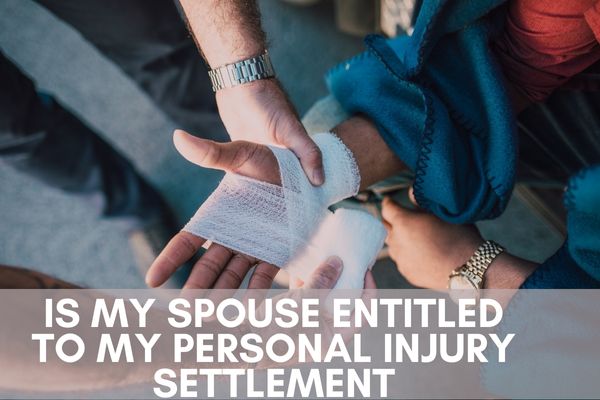When an accident happens to the other spouse, people ask, “Is my spouse entitled to my injury settlement” The responsible person’s insurance company will reimburse the injured person for medical bills, pain and suffering, and other ongoing medical expenses.
Personal injury cases are legal disputes that arise when someone suffers harm from an accident or injury, and someone else may be legally responsible for that injury or damage.
A personal injury attorney will work with insurance companies and hospital attorneys if the case involves medical malpractice.
Is my spouse entitled to my injury settlement
An individual injury case can be formalized through a personal injury attorney who provides you with legal representation in a civil court proceeding.
This court hearing seeks to find other people at law at fault through a court ruling, or, more commonly, these disputes can be resolved through informal settlement negotiations before any lawsuit is filed.
Depending on the type of personal injury and damages to the injured party, the duration of the lawsuit can range from a few months to a few years.
However, there are two things most people don’t want to experience – divorce and personal injury. Unfortunately, people get divorced, and it is not uncommon for individuals to suffer damages caused by negligent actions.
But what happens if these two things coincide with each other?
You can be confident that property division will be one of the most contentious parts of the separation process. A personal injury settlement will undoubtedly count as property; this issue needs to be discussed.
Is my spouse entitled to my injury settlement? Yes, a spouse can receive private injury compensation if you and your spouse file for divorce, portions of your settlement may be considered marital property and subject to equitable division between you.
The other parts of the settlement are separate properties that you maintain. If you have been injured and are expecting a personal injury settlement, and if you are also going through a divorce, you need to know whether or not your spouse qualifies for any part of your injury settlement.
Property settlements can be complicated, especially when the estranged spouses have a significant asset pool. But what happens when a spouse receives a sizeable personal injury payout? Is this considered a ‘contribution’ to the entire public property?
There is no exact mathematical formula for calculating the division of property. However, family law does specify the number of steps to work through when determining a property settlement.
The first step in a property settlement is to identify and value all property owned by the parties, including any jointly or separately owned property.
The second step is to evaluate both parties’ contributions to the marriage or de facto relationship. This includes financial and non-financial assistance and grants made as a parent or housewife.
Thirdly, the court will consider the factors affecting each party’s future needs.
They may consider the age and health status of both parties, whether either party has care and control over the children of the relationship (under the age of 18), the extent to which the marriage affects the earning capacity of either party and any other factor the court considers relevant.
Finally, the court will determine whether the proposed property division is “fair and equitable.”
Personal Injury Settlement Rule
The rule generally applies to personal injury compensation because the funding earned is separate from the marriage. Even in a divorce, that money will remain out of the settlement.
A normal division of assets would require all funds, accounts, property, and possessions to proceed through a partition based on a judge’s decision. This includes debts and other liabilities. What the court’s authority decides will become the rule.
However, a personal injury settlement is not generally included as a spouse’s property because it is a recovery of damages owed to the individual and not the spouse.
What is Marital Property Between Spouses?
Almost everything accrued during a marriage becomes marital property. However, some states will separate certain items and guarantee that only the person who won them will keep them after the relationship ends.
In a typical divorce, marital property will include joint bank accounts, property in one or both names, and other assets that the spouses will use over time. This can also have a car with only one word, but both utilized at some point in time and other assets that are part of the couple’s life.

There are some exceptions and ways around this. The exceptions include the following:
Individual Property
Personal injury settlements made to the successful claimant are generally unique and individual property. This defines compensation outside the marital property as a person’s reward. However, there are exceptions when the husband takes the money and mixes it with marriage.
Other exceptions arise when a judge requests a hearing to determine whether that money should become marital property. Depending on the specific state and court, judgment may advance through division in the divorce process.
Community Property
Some states have rules that place property each person acquires through community property to remain divisible during a divorce regardless of how much each person achieved or earned within the marriage.
The only exception to this rule is when the assets are separate properties. These must be present as owned or claims before the commencement of the marriage, as a gift or the like, or if it is through pain and suffering, settling a personal injury case. Any other part of the settlement may become joint property because it occurs naturally throughout the marriage.
Keeping The Settlement Separate
Although settlement decisions may become marital property, keeping the funds separate from the marriage is often possible.
Individuals may have this opportunity by creating a private trust or account that remains outside the relationship if they believe the marriage will end in divorce. Pursuing this path as an option is necessary before there is a risk of divorce in the courts.
However, if there is no ability to place the fund in a private trust account, the judge may view the spouse as attempting to interfere or hide assets from the divorce process. It is usually by holding the particular assets in a special type of trust that the spouse can keep out of the marriage.
This may reduce the funds available for spousal support or alimony, but it is usually a valid measure possible.
It is essential to contact an estate planning attorney or divorce attorney to ensure that no laws are being violated or that the divorce process may proceed without problems when using this path to provide a complete settlement for a successful personal injury claim.
By contacting an attorney, the spouse may keep the compensation off the marital property or determine how much they will need to stay available.”
How To Acquire A Personal Injury Settlement
1. Consider A Specific Settlement Amount
When putting together your Personal Injury Settlement Request Letter, you’ve discovered what you believe your claim is worth. Before you speak to your insurance adjuster about your application, determine the minimum settlement number you will accept within this range.
This number is for your private information, not something you might reveal to an adjuster. But before the offers and counteroffers start going back and forth, it helps to be mindful of the bottom line.
Remember, you don’t have to stick to the look you initially set for yourself. If the adjuster points out facts that you did not consider but that make your claim weaker, you may have to lower the minimum number somewhat.
And if the adjuster starts with a low settlement offer or a number at or near the bottom line—or if you discover evidence that strengthens your claim, you may want to revise up. You can learn more about the factors that affect the value of a personal injury settlement.

2. Don’t Jump At The First Offer
It is standard practice for insurance adjusters to start negotiations by offering a meager amount first. With this tactic, the officer is trying to see if you understand your claim’s value and your patients.
When the first offer is made, your response should depend on whether it’s reasonable but too low or so low that it’s just a tactic to see if you know what you’re doing. If the offer is valid, you may submit a counteroffer slightly less than the amount of your application letter.
This shows the modifier that you are also rational and willing to compromise. A little more haggling should quickly get you a final settlement amount that you both think is fair. In these negotiations, don’t bother checking all the facts again. Assert the most vital points in your favor – for example, that the insured was utterly wrong.
3. Get The Adjuster To Justify A Low Bid
If, in your first conversation, the adjuster makes an offer so low that it’s just a negotiating tactic to see if you know the value of your claim, don’t immediately lower the amount you put in your demand letter.
Instead, ask the adjuster to tell you the specific reasons for the decrease in supply. Take notes about the conversation. Then write a brief letter responding to each of the factors the officer mentioned.
Depending on the strength of the adjuster’s reasons, you can lower the demand slightly, but wait and see if the adjuster budges before dropping. The next time you speak with the officer, start by asking for a response to your response letter.
The adjuster should now give you a reasonable offer that can lead to a fair final settlement number.
4. Emphasize Emotional Points In Your Favor
During negotiations, bring up any emotional points that support your claim. For example, refer to it if you send the officer a solid photo of a wrecked car or severe-looking injury. If you find a beer bottle in the other driver’s car, refer again to the possibility of alcohol.
If similar incidents occurred similarly at that location, mention the officer. If your injury interferes with your ability to care for your child, say that your child suffered as a result.
Although there is no way to put a dollar value on these factors, they can be compelling in convincing an insurance company to settle an accident claim.
5. Wait For A Response
Do not reduce your application more than once until you get a new offer from the adjuster. Never decline a demand twice without an increasing cross-width from the adjuster; It is simply not a good bargain.
If the officer comes up with more reasons for a low offer, go to each one.
Once you have dealt with all of the officer’s arguments, you will find that there is no reasonable offer, and you’ll have to try and put some extra pressure on the insurance company.
6. Know When To Hire A Lawyer
If at some point, you feel that negotiations are not going as well as you had hoped, you may consider speaking to a personal injury attorney, especially if:
- You claim damages for serious injury, pain, and suffering over a few thousand dollars.
- An insurance adjuster is unlikely to take a non-representative claimant seriously when claimed damages cost tens of thousands or more.
- You are seeking future damages. If you claim loss of income or medical costs in the future, you may need an attorney to work out an adequate settlement.
- There is an error issue. If there is some question about who was at fault in the underlying incident, you may need a lawyer to formulate your argument correctly.

7. Documentation
When you and the officer finally agree on a number, immediately confirm the agreement in a letter to the officer.
The letter can be short and sweet. Review this Settlement Confirmation Letter Sample to get a sense of what this document might look like.
Conclusion
Damages in personal injury claims are compensated for different types of injuries. There are compensations for financial loss, medical expenses, lost wages, and other property losses, which are considered cash.
There are also compensations awarded for pain, suffering, emotional distress, and loss of union, which are considered “personal” because they compensate that particular individual for the pain or distress they experienced.
So the parts of the settlement classified as “pain and suffering” or “loss of union” are not divisible between the spouses. This is the same rule that applies to gifts and inheritances.
However, damages intended for loss of wages or medical expenses may be divisible, as both spouses were affected by the loss of income or expenses.
So if you claim recovery as a joint asset, you can claim a portion of the damages intended for lost wages, medical expenses, or other financial losses. Still, you cannot claim a part of your spouse’s compensation for pain, suffering, or emotional distress.








